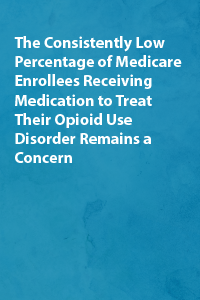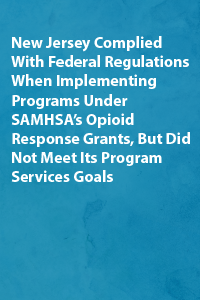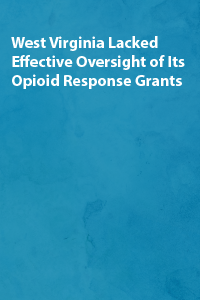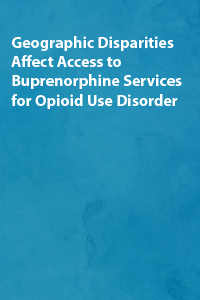HHS-OIG's Efforts to Address the Opioid Epidemic
The opioid epidemic continues to impact communities across the U.S., claiming tens of thousands of lives each year and overwhelming health care systems. For the Department of Health and Human Services Office of Inspector General (HHS-OIG), combating the opioid crisis is a top priority. HHS-OIG has found critical gaps in care for Medicare and Medicaid patients battling opioid use disorder. During National Recovery Month, HHS-OIG employees reflect on their work addressing this nationwide epidemic.

"Addressing the opioid epidemic is a priority for HHS-OIG because it affects both public health and the integrity of federal health programs. Our audit report shows that while Massachusetts' opioid treatment programs have made notable strides in meeting federal and state standards, there is still work to be done. We are dedicated to focusing efforts on these programs to ensure that everyone seeking recovery receives the highest quality of care and support. By tackling this epidemic, our goal is to enhance care, prevent fraud and abuse, and ultimately improve health outcomes for individuals and communities impacted by this crisis," said Regional Inspector General for Audit Services Curtis M. Roy about Massachusetts Opioid Treatment Program Services Met Many of the Federal and State Requirements.

“Opioid-related overdose deaths claim tens of thousands of lives each year. To help address this crisis, we must act to ensure that everyone who needs treatment for opioid use disorder has access to it. Research has shown that certain medications can decrease use of illicit opioids and opioid-related overdose deaths. Yet, HHS-OIG found that fewer than 1 in 5 Medicare enrollees with opioid use disorder—just 18 percent—receive medication to treat their disorder,” said subject matter expert on Opioids for the Office of Evaluation and Inspections Miriam G. Anderson about The Consistently Low Percentage of Medicare Enrollees Receiving Medication to Treat Their Opioid Use Disorder Remains a Concern.

“As the United States continues to struggle with the opioid crisis, access to medications that treat opioid use disorder (MOUD) is essential to address the high rates of opioid use disorder and overdose mortality. Medicare and Medicaid play important roles in providing MOUD, but access concerns persist in both programs. For example, HHS-OIG has found that hundreds of counties in high need of MOUD services had few or no MOUD providers treating Medicare or Medicaid enrollees, and many enrollees with opioid use disorder did not receive MOUD through their respective programs,” said team leader and Social Science Research Analyst for the Office of Evaluation and Inspections Louis A. Day about Medicare and Medicaid Enrollees in Many High Need Areas May Lack Access to Medications for Opioid Use Disorder; The Consistently Low Percentage of Medicare Enrollees Receiving Medication to Treat Their Opioid Use Disorder Remains a Concern; and Many Medicaid Enrollees with Opioid Use Disorder Were Treated with Medication; However, Disparities Present Concerns.

“In an effort to combat the opioid epidemic, we commend New Jersey for its compliance with federal regulations through the implementation of programs under its Opioid State Targeted Response (STR) and State Opioid Response (SOR) grants, along with the establishment of effective internal controls. However, New Jersey did not achieve the service goals outlined in these grants. There is a need for more rigorous analysis by New Jersey to identify potential factors that could impede grant-funded activities, which would enhance the accuracy of goal estimations in future STR and SOR grant applications,” said Regional Inspector General for Audit Services Jennifer C. Webb about New Jersey Complied With Federal Regulations When Implementing Programs Under SAMHSA’s Opioid Response Grants, But Did Not Meet Its Program Services Goals.

“National Medicaid data plays a crucial role in monitoring the opioid crisis, but as highlighted in our 2019 report, it was not yet a reliable tool due to significant limitations. The report, which analyzed data from January 2017 to March 2018, indicated that without quality data, there were missed opportunities to identify individuals at risk of opioid misuse and overdose, problematic providers, and areas in need of targeted intervention at a national level. As an example of what could be identified with good data, a 2018 report identified nearly 6,000 individuals across six Appalachian states who received potentially harmful amounts of opioids through Medicaid, with more than 450 at risk of misuse or overdose. While the Centers for Medicare & Medicaid Services has made efforts to enhance the Transformed Medicaid Statistical Information System data since the 2019 report, these earlier findings underscored the urgent need for improved data quality to effectively address and mitigate the opioid crisis nationally,” said Assistant Regional Inspector General for the Office of Evaluation and Inspections Hilary E. Slover about National Review of Opioid Prescribing in Medicaid Is Not Yet Possible and Opioids in Medicaid: Concerns About Opioid Use Among Beneficiaries in Six Appalachian States in 2018.

“The audit of West Virginia’s STR and SOR grants highlighted non-compliance with federal regulations. For instance, West Virginia did not have adequate procedures in place to determine whether it met SOR grant program goals because West Virginia did not require subrecipients to collect the needed data to determine whether goals were being met. We recommended several improvements, including enhanced documentation retention, periodic reviews of supporting documentation, and revisions to progress reports,” said Regional Inspector General for Audit Services Trish M. Wheeler about West Virginia Lacked Effective Oversight of Its Opioid Response Grants.

“The recent HHS-OIG audit underscores a pivotal issue in Washington state's opioid treatment programs, unveiling several deficiencies in adherence to federal and state regulations. This issue is significant because each instance of non-compliance may not only jeopardize individual therapeutic outcomes, but also could undermine the overarching effort to combat the opioid epidemic. Ensuring that treatment programs follow set standards is important for delivering high-quality care and addressing the opioid crisis effectively,” said Assistant Regional Inspector General for Audit Services Marc DeGuzman about Opioid Treatment Programs in Washington State Did Not Fully Comply With Federal and State Requirements, Which May Have Put Medicaid Enrollees at Risk for Poor Treatment Outcomes.

“At HHS-OIG, addressing the opioid epidemic is not just a priority—it’s a commitment we care about deeply. Our evaluations, which draw on data from a range of HHS programs, have uncovered geographic and demographic disparities in opioid use disorder treatment. These findings are more than just numbers; they represent real opportunities to make a difference. By pinpointing where resources are needed most, we can help policymakers and program administrators ensure that underserved communities receive life-saving treatment. We invite users to explore our interactive geospatial web applications to learn more about the data that’s driving change and impact,” said Social Science Analyst for the Office of Evaluation and Inspections Kasey M. Memphis about Access to Providers Prescribing or Dispensing Medications for Opioid Use Disorder in Medicare and Medicaid; The Consistently Low Percentage of Medicare Enrollees Receiving Medication to Treat Their Opioid Use Disorder Remains a Concern; Many Medicaid Enrollees with Opioid Use Disorder Were Treated with Medication; However, Disparities Present Concerns; and Geographic Disparities Affect Access to Buprenorphine Services for Opioid Use Disorder.
For more information on HHS-OIG's continuing efforts to combat the opioid epidemic, view the relevant Work Plan items, which outline forthcoming audit, evaluation, and inspection reports aimed at enhancing the economy, efficiency, and effectiveness of HHS’ opioid-related programs and services. In addition, you can browse through all of our published reports on opioids.
